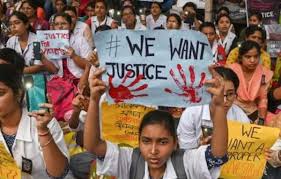
Doctors disappointed as talks with the Chief Secretary yield little progress
A recent meeting between leading doctors' associations and West Bengal's Chief Secretary, Manoj Pant, resulted in no concrete outcomes, leaving medical professionals disappointed. Following the nearly two and a half-hour meeting, leading doctors expressed frustration, notably with the government's unwillingness to provide a written pledge to meet their objectives.
The conference focused on the 10 demands made by junior doctors, seven of which the state government apparently has made progress on. However, Chief Secretary Pant stated unequivocally that it was impossible to establish a "timeline" for resolving the remaining three important issues, prompting frustration in the medical community. He highlighted that the administration is striving to resolve the concerns but cannot commit to particular timetables.
Representatives from several medical societies, including the Indian Medical Association (IMA), along with high government officials like Home Secretary Nandini Chakraborty and the Director of Health Services, attended the meeting. The state's health secretary, Narayanswarup Nigam, was noticeably absent, a move that some of the protesting doctors had hoped for. The physicians' dissatisfaction intensified when Nigam participated in a Supreme Court hearing on the RG Kar Medical College issue, leading to his absence.
During the discussions, leading doctors expressed concerns about inefficiency and potential corruption at the state's Health Recruitment Board and West Bengal Medical Council. Furthermore, they brought up the issue of nine doctors imprisoned for their demonstrations and demanded the dismissal of Sudipta Ray, a health officer and local political figure. However, the government stated that it was not possible to dismiss an elected person in this manner.
As the meeting ended, leading doctors indicated mounting dissatisfaction with the government's approach. Dr. Kaushik Chaki, president of the West Bengal Physicians Forum, expressed his dissatisfaction, saying, "Rather than debating in an air-conditioned room, the Chief Secretary should visit the junior physicians on hunger strike. It appears that the government's ego has taken precedent over their lives."
The ongoing hunger strike by junior doctors was a major source of worry at the meeting, with the administration pushing the doctors to halt their protest for their own health and resume their responsibilities. However, without written assurances from the government, prominent doctors argued that returning to normalcy in the current conditions would be difficult.
While conceding discontent, Chief Secretary Pant insisted that not every aspect of the conference was unfavorable. He emphasized that the state has produced a status report outlining the progress made on seven of the objectives, and he reaffirmed the government's commitment to upgrading the state's healthcare infrastructure. However, he maintained that it was not possible to set a deadline for the outstanding concerns, emphasizing that any improvements would be made collaboratively to benefit the entire healthcare system.
As tensions between the medical community and the state government persist, doctors have planned additional protests, including a symbolic "Carnival of Dissent" to coincide with Kolkata's Durga Puja Carnival. Given the ongoing protests and disruptions to public healthcare services, the outcome of these negotiations could significantly impact West Bengal's healthcare in the near future.
The ongoing standoff between the government and medical professions could lead to various serious consequences, including disruptions to healthcare services: West Bengal's already overburdened public healthcare system is likely to face additional strain due to the protracted strike and protests. With junior doctors on hunger strike and senior doctors dissatisfied, there could be a major lack of medical personnel, resulting in delayed procedures and lower quality care.
The failure to meet critical demands, especially without providing a clear deadline, has left the medical community deeply dissatisfied, casting a shadow over the future of healthcare in West Bengal. The ongoing protests and hunger strikes by doctors have already begun to strain public healthcare services, with severe consequences for patient care. However, beyond the immediate impact on the healthcare system, there are broader political implications that could exacerbate the situation.
The presence of elected officials, such as Sudipta Ray, and allegations of corruption within health recruitment authorities have added a political dimension to the doctors’ grievances. Senior doctors have voiced concerns over the involvement of political figures in healthcare administration, accusing them of contributing to the inefficiencies and mismanagement within the system. This could spark political disputes and further destabilise state governance, especially with elections on the horizon. As tensions rise, the government’s inability to resolve these issues promptly could lead to increased public dissatisfaction, potentially becoming a focal point in political campaigns.
Without swift government intervention to address both the healthcare and political aspects of the crisis, the situation risks spiralling into a larger catastrophe. The long-term ramifications could include a continued erosion of public trust in the healthcare system, increased privatisation of healthcare services, and deeper political instability. As both the medical community and the public await decisive action, the stakes remain high, not only for healthcare but also for the future of governance in the state.